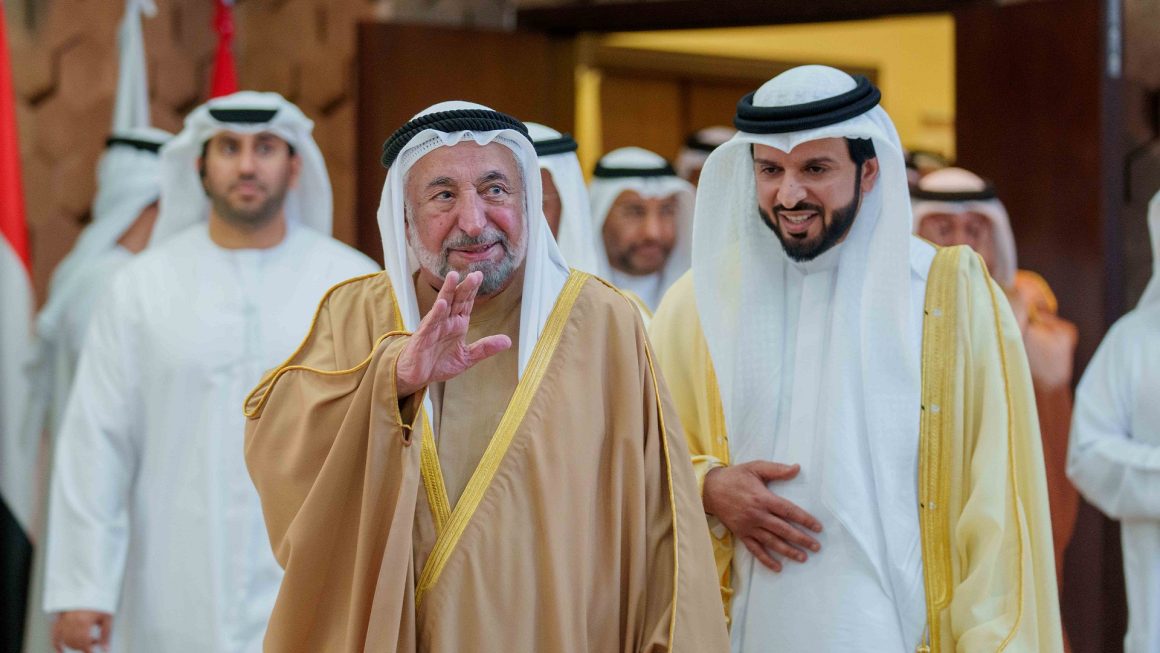His Highness Sheikh Dr. Sultan bin Mohammed Al Qasimi, Supreme Council Member and Ruler of Sharjah, attended on Tuesday, the inauguration of the 7th International Arabic Language Conference (IALC) organized by the Arabic Language Educational Center for the Gulf States in Sharjah in cooperation with the Ministry of Education, which is being held over two days in the University City under the title “Teaching and Learning the Arabic Language, Looking Towards The Future: Requirements, Opportunities and Challenges and under the slogan “In Arabic We Create” .
The opening ceremony began with the national anthem of the United Arab Emirates, followed by reciting verses from the Holy Qur’an, after which Dr. Issa Al Hammadi, Director of the Arabic Language Educational Center for the Gulf States in Sharjah, delivered a speech expressing his thanks and appreciation to His Highness the Ruler of Sharjah for giving the Arabic language his greatest attention, and for his continued support for the Center in Sharjah.
During his speech, Al Hammadi outlined the goals of the conference, which is one of the Center’s approved programs for the 2023–2024 . These goals included introducing individual and institutional efforts and their role in developing the learning of the Arabic language as well as discussing issues, studies, research, best practices, and scientific and practical experiments related to the reality of teaching and learning the Arabic language, as well as knowing about the most recent advancements, innovative projects, reports, and fruitful experiences.
Al Hammadi emphasized that the conference’s significance rests in fostering innovation and creativity, putting forth fresh ideas for addressing issues that arise in the teaching and learning of Arabic, and creating workable, empirical solutions to challenging problems. In addition to encouraging research and studies related to serving the Arabic language and seriously working to develop a clear vision based on performance and participation to open up future horizons for serious research to develop and employ contemporary concepts and theories in teaching and learning the Arabic language, as well as to know the possibilities available to serve the Arabic language. This will benefit educators, educational supervisors, curriculum designers, researchers, and decision makers.
In closing, Al-Hammadi made the point that the Arabic language requires significant institutional work, the people’s belief in it, the restoration of respect for it, and coordinated societal efforts that make it a common denominator. These efforts should be made while working concurrently in the fields of education, the media, and institutions to advance the teaching, learning, and preservation of the Arabic language.
His Highness the Ruler of Sharjah and the attendees watched a visual presentation prepared by the Arabic Language Educational Center for the Gulf States in Sharjah, which reviewed the center’s most important achievements in the field of training, conferences, seminars, scientific publications, and programs.
Dr. Walid Mahmoud Abu Al-Yazid delivered a speech to the participants praising the efforts of Sharjah and the Center in enhancing the presence of the Arabic language, and providing the opportunity to hold forums that discuss everything related to teaching the Arabic language, indicating that the conference is an important vital platform for exchanging ideas and experiences among the participating researchers and specialists in teaching the Arabic language, it also contributes effectively to enriching the international educational arena with the most prominent experiences and skills related to Arabic language curricula and teaching methods.
At the end of the opening ceremony, His Highness the Ruler of Sharjah honored the parties participating in the event , the scientific committee of the conference, and a number of experts participating in the opening session, in addition to the winners of distinguished research in the conference. His Highness also received a souvenir from the center, and the first copy of the publication of the seventh International Arabic Language Conference, which consists of 4 volumes.
The Seventh International Arabic Language Conference aims to diagnose the reality of teaching and learning the Arabic language at the regional and global levels, review the latest academic and applied studies and research, ideas and visions about developing the teaching and learning of the Arabic language, anticipate the challenges facing the Arabic language, present proposals and solutions to them, and benefit from experiences of educational institutions in the Arab world, exchanging culture and knowledge on contemporary issues, benefiting from modern software and technologies in teaching the Arabic language, identifying the challenges, positives and negatives related to employing technology in teaching the Arabic language, in addition to anticipating the future of education in the Arab world and the challenges facing its development.
The conference program is being held in action and remotely including 22 scientific symposiums, and four symposiums for best practices and experiences, with the participation of 110 experts and researchers, with a total number of research and studies amounting to 82 and a number of best practices amounting to 13 specialized practices in education.
The conference topics include: developing Arabic language curricula, preparing the Arabic language teacher in the twenty-first century, modern trends in evaluating Arabic language teaching, strategies for teaching the Arabic language, employing modern technologies in teaching and learning the Arabic language, programs for teaching the Arabic language to non-native speakers, and teaching and learning the language remotely.
The opening ceremony was attended by His Excellency Dr. Abdullah bin Mohammed Belhaif Al Nuaimi, Chairman of Sharjah Consultative Council; His Excellency Professor Jamal Salem Al Tarifi, President of Al Qasimia University; Mohammed Obaid Al Zaabi, Chairman of Protocol Department, Engineer Khalid bin Butti Al Hajri, Director General of the University City, and Mohammed Hassan Khalaf, Director General of the Sharjah Broadcasting Authority, Ali Al Hosani, Director of the Sharjah Private Education Authority, and a number of university directors, academic institutions, specialized associations, university professors, experts and specialists in the Arabic language.

